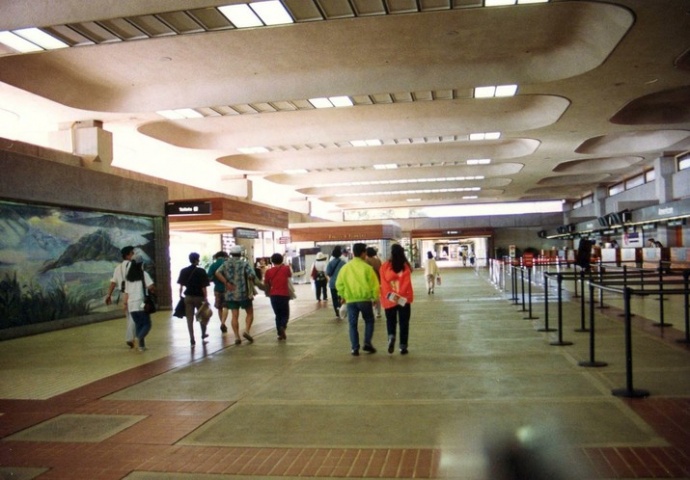Airport Corporation Proposal Seeks to Address Inefficiencies

Kahului Airport Check-In Lobby. File photo courtesy of Department of Transportation.
The Hawaiʻi Department of Transportation, in coordination with the Airlines Committee of Hawaiʻi, the Airport Concessionaires Committee, and various stakeholders have joined in expressing support for an airport corporation proposal currently being debated in the State Legislature.
DOT representatives say the entities agree that inefficiencies associated with the Airports Division system must be changed, which are reasons they say they are backing the measure.
According to the DOT, the current process requires nearly 50 “detailed and time consuming steps” in order to complete a single construction project. “It can be a redundant process that can lead to lengthy and costly delays, in part due to the multiple agencies that impact decision making,” DOT officials said in a press release today.
The department is attributing such delays to stalls with the Airport System capital improvement programs, that they say has resulted in lost economic contribution and jobs, and insufficient airport capacity to meet airline needs.
At the same time, despite the financial self-sufficiency of the Airport System, state-imposed constraints to Airport operating budgets and staffing have resulted in the progressive deterioration of the quality of terminal facilities at the 15 airports across Hawaiʻi that serve more than 34 million passengers (enplaning and deplaning) each year, the DOT states.
“Albert Einstein famously stated, ‘we cannot solve our problems with the same thinking we used when we created them.’ This logic can be applied to our airports system. The issues, delays and problems we face on a daily basis cannot be fixed without changing the process,” said Ford Fuchigami, Hawaiʻi Department of Transportation Director.
“The current State governance model limits our ability to deliver first class airports. Alarmingly airport management does not have control over the outcomes for which the State ultimately holds them accountable. All the critical drivers of success for airport projects are subject to external decisions and conflicting priorities, including budget approval and legislative oversight,” continued Director Fuchigami. “People often say that government should be run like a business. We agree, however even the best private sector CEO’s would have difficulty preventing delays given the state’s bidding process, regulations and statutes that must be followed.”
Unlike other units of State government, the Airports Division is self-sustaining and does not receive general funds, meaning HDOT does not receive income tax money, to operate. Instead HDOT generates its own revenue through user fees.
The Airport Division’s project costs, operating expenses and salaries comes from concession and airline revenue. Primary sources of funding include, landing fees, terminal rentals, rental car, duty free and parking revenues, along with passenger facility charges.
Despite generating its own revenue, the department is still dependent on legislative approval, which it says is challenging considering the turnover in lawmakers and changes in committee assignments.
“Airports are unlike other government agencies and are an important economic hub and needs to run and operate in a business fashion quickly and efficiently. The current approval process is simply too long and typically requires approvals and delays each step of the way resulting in costly delays,” said Jim Stone, Airport Concessionaires Committee. “The process now is such that before tenant improvements can receive necessary approvals much time passes resulting in higher construction costs and lost time benefiting from the completed improvements. There simply has to be a better way to avoid losing time and money.”
“Hawaiʻi’s airports are facing continuing traffic growth and must deliver a large development program that is already behind schedule,” Blaine Miyasato, Co-chair of the Airlines Committee of Hawaiʻi, which is made up of 20 signatory air carriers that contributes more than half of the State Airport System budget. “The status quo is holding us back. An airport corporation will help move the airports system and its projects forward faster and more efficiently.”
Hawaiʻi is one of only three states in the nation to still operate and manage its airport system (Alaska and Maryland are the other two). In 2015, the Hawaiʻi State Legislature passed a resolution urging the HDOT to complete a feasibility study and provide recommendations on how the airports should be operated. The study recommended the establishment of an airport corporation.
“In the last 10 years, many of the top 100 airports have moved to an independent authority governance structure guided by qualified boards who can focus on the unique challenges of managing, operating and developing airports. The need for operating policies and timely decision-making is even more imperative for an airport system that is facing a large capital improvement program,” said Gina Marie Lindsey, CEO of GML Advisors whose experience includes managing the Los Angeles World Airports and Seattle-Tacoma International, where she successfully completed multibillion dollar modernization and improvement projects. “Unless Hawaiʻi is willing to fall further behind in meeting traveler expectation, it needs to implement an airport corporation.”
About an airport corporation as outlined by the DOT:
The airport corporation proposal will help reduce the amount of red tape and bureaucracy experienced today by allowing projects to start sooner and adapt quicker because it would allow the Airport Board to meet year round, instead of only five months when the Legislature is in session (January-May).
An independent airport corporation with a dedicated decision-making Board meeting throughout the year would enable capital improvement program decisions to be made faster. Streamlined procedures for budgeting, procurement, and human resources processes configured to the unique needs of the Airport System would enable the airport enterprise to operate more efficiently. Operating budgets defined by airport needs would enable improvement both to terminal facilities and the quality of services and amenities offered to visitors, consistent with current airport industry standards.
While such an airport corporation would be independent of other State departments, it would retain full public accountability via Board appointments, public meetings, and full transparency of all policies and procedures, consistent with public sector standards and best practices. Further, recognizing the unique importance of the Airports System to our island State, HDOT believes that an independent airport corporation, operating airports to achieve their full potential, would maximize their contribution to the State economy, improve global access and inter-island mobility, and in so doing strengthen their critical role in sustaining the social and cultural fabric of the State.
The airport corporation will be reviewed and certified by the Federal Aviation Administration. The FAA also imposes many regulatory requirements on airports and consistently monitors compliance.
The transition to a Hawaii airport corporation would include the retention of current employees with no loss in benefits, assets, funds, accounts, contracts and liabilities.
Under the corporation, the management and disposition of the airport lands does not change as they would remain State lands.
State lawmakers are still deciding on the SB658. To view its status, a draft of the current version of the bill and testimony visit the Hawaiʻi State Legislature website by clicking here.










